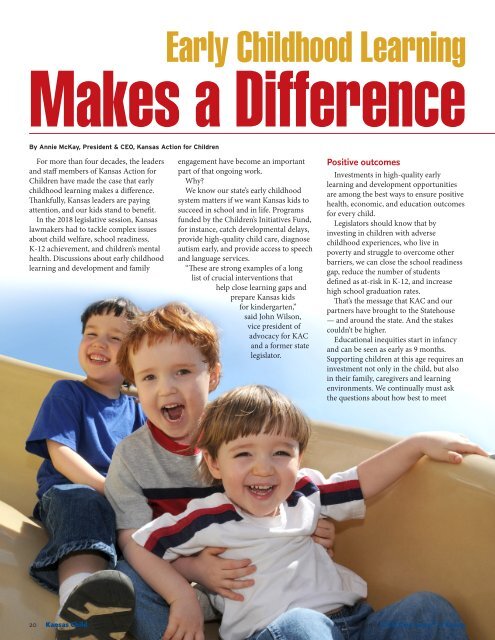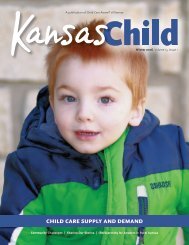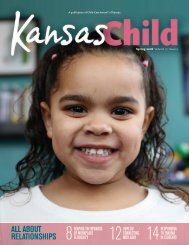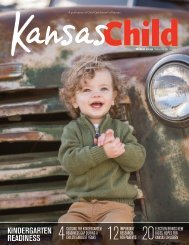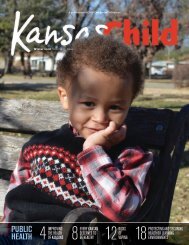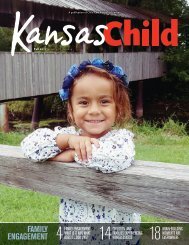2018 Summer Kansas Child
School Readiness
School Readiness
You also want an ePaper? Increase the reach of your titles
YUMPU automatically turns print PDFs into web optimized ePapers that Google loves.
Early <strong>Child</strong>hood Learning<br />
Makes a Difference<br />
By Annie McKay, President & CEO, <strong>Kansas</strong> Action for <strong>Child</strong>ren<br />
For more than four decades, the leaders<br />
and staff members of <strong>Kansas</strong> Action for<br />
<strong>Child</strong>ren have made the case that early<br />
childhood learning makes a difference.<br />
Thankfully, <strong>Kansas</strong> leaders are paying<br />
attention, and our kids stand to benefit.<br />
In the <strong>2018</strong> legislative session, <strong>Kansas</strong><br />
lawmakers had to tackle complex issues<br />
about child welfare, school readiness,<br />
K-12 achievement, and children’s mental<br />
health. Discussions about early childhood<br />
learning and development and family<br />
engagement have become an important<br />
part of that ongoing work.<br />
Why?<br />
We know our state’s early childhood<br />
system matters if we want <strong>Kansas</strong> kids to<br />
succeed in school and in life. Programs<br />
funded by the <strong>Child</strong>ren’s Initiatives Fund,<br />
for instance, catch developmental delays,<br />
provide high-quality child care, diagnose<br />
autism early, and provide access to speech<br />
and language services.<br />
“These are strong examples of a long<br />
list of crucial interventions that<br />
help close learning gaps and<br />
prepare <strong>Kansas</strong> kids<br />
for kindergarten,”<br />
said John Wilson,<br />
vice president of<br />
advocacy for KAC<br />
and a former state<br />
legislator.<br />
Positive outcomes<br />
Investments in high-quality early<br />
learning and development opportunities<br />
are among the best ways to ensure positive<br />
health, economic, and education outcomes<br />
for every child.<br />
Legislators should know that by<br />
investing in children with adverse<br />
childhood experiences, who live in<br />
poverty and struggle to overcome other<br />
barriers, we can close the school readiness<br />
gap, reduce the number of students<br />
defined as at-risk in K-12, and increase<br />
high school graduation rates.<br />
That’s the message that KAC and our<br />
partners have brought to the Statehouse<br />
— and around the state. And the stakes<br />
couldn’t be higher.<br />
Educational inequities start in infancy<br />
and can be seen as early as 9 months.<br />
Supporting children at this age requires an<br />
investment not only in the child, but also<br />
in their family, caregivers and learning<br />
environments. We continually must ask<br />
the questions about how best to meet<br />
20 <strong>Kansas</strong> <strong>Child</strong> A Publication of <strong>Child</strong> Care Aware ® of <strong>Kansas</strong>


